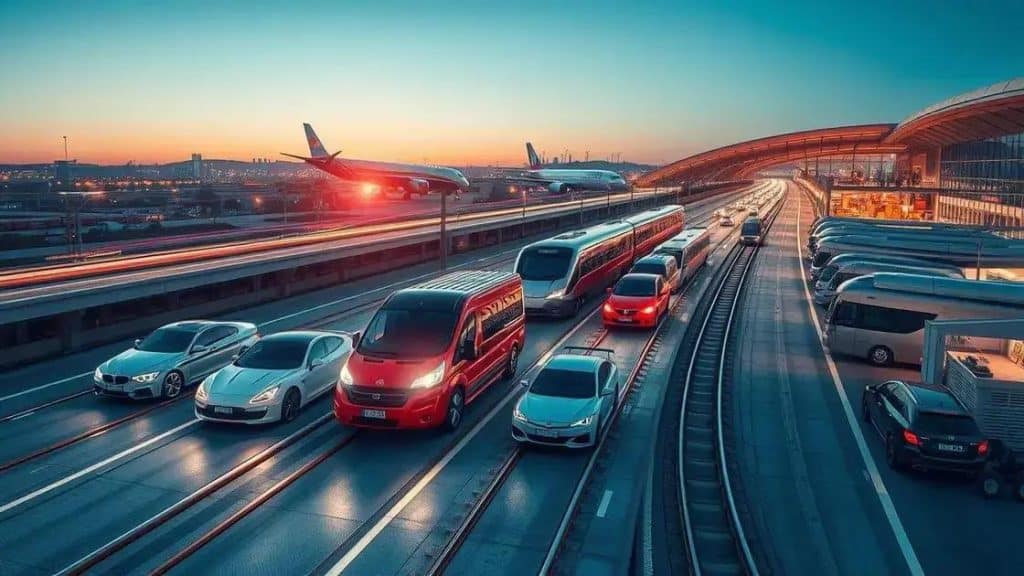Transportation sector updates: What you need to know

Anúncios
The transportation sector is experiencing significant updates through advancements in technology, sustainability efforts, and regulatory changes, addressing challenges while creating new opportunities for innovation and efficiency.
Transportation sector updates are vital for understanding how shifts in regulations, technology, and consumer behavior affect travel and logistics. Have you noticed how quickly things can change in this area? Let’s explore some key insights.
Anúncios
Current trends shaping the transportation sector
Understanding the current trends shaping the transportation sector is essential for industry stakeholders. These trends are influenced by technology, consumer preferences, and environmental concerns.
Technological Advances
Technology is revolutionizing transportation like never before. Innovations such as electric vehicles (EVs) and autonomous driving are becoming mainstream. Cities are also investing in smart traffic management systems to enhance mobility.
Anúncios
Consumer Preferences
Consumers today prioritize convenience and sustainability. This has led to a surge in rideshare services and public transportation options. Many people are opting for more eco-friendly modes of travel, reflecting a shift in societal values.
- Increased demand for shared mobility solutions.
- More focus on reducing carbon footprints.
- Preference for cities with sustainable transport options.
The emphasis on sustainability is also manifesting in policies and regulations. Governments are incentivizing green technologies and pushing for lower emissions within the sector. This not only helps the environment but also improves public health.
Regulatory Changes
New regulations are being introduced to govern the transportation sector. These include stricter emissions standards and stricter safety protocols. Companies must adapt quickly to stay compliant and competitive.
Moreover, the financial landscape is changing as well. Investments in transportation infrastructure are crucial for supporting these trends. Public-private partnerships are often the key to financing major projects.
As these trends develop, they will shape the future of transportation, making it more efficient, sustainable, and user-friendly. Every stakeholder has a role in driving these changes forward.
Impact of technology on transportation

The impact of technology on transportation has been profound, transforming how we travel and move goods. From smart tools to advanced vehicles, technology is paving the way for a more efficient and safer transportation system.
Advancements in Vehicle Technology
Modern vehicles are now equipped with cutting-edge features such as autonomous driving, which enhances safety and efficiency. Features like lane assist and adaptive cruise control are becoming standard, making roads safer for everyone.
Smart Infrastructure
Cities are investing in smart infrastructure that can communicate with vehicles. This includes smart traffic lights that adjust based on real-time traffic conditions, helping to reduce congestion.
- Integration of apps for user convenience.
- Real-time tracking of public transport.
- Use of data analytics to improve service quality.
The adoption of electric vehicles (EVs) is also a game changer. With advancements in battery technology, EVs can now travel longer distances quickly and efficiently. Governments around the world are promoting the shift to EVs to meet sustainability goals and reduce emissions.
Another significant innovation is the rise of ridesharing services. These platforms have changed how people think about ownership and convenience in transportation. By connecting users with drivers, they have made commuting simpler and more accessible.
Moreover, logistics has benefited from technology through automation and improved supply chain management. Drones and automated delivery vehicles are being tested, which could reshape how goods reach consumers.
As technology continues to advance, the transportation sector will keep evolving. Embracing these changes is essential for a more connected and efficient future.
Sustainability efforts in transportation
Sustainability efforts in transportation are becoming increasingly important as society aims to reduce its carbon footprint. All around the world, organizations and governments are focusing on eco-friendly solutions that benefit both people and the planet.
Public Transportation Improvements
One significant area of focus is public transportation. Cities are investing in electric buses and trains to reduce emissions. These improvements not only contribute to cleaner air but also encourage more people to use public transit, which can ease traffic congestion.
Infrastructure for Electric Vehicles
Electric vehicles (EVs) are another critical component of sustainability initiatives. Governments are installing charging stations to support the growing number of EVs on the road. Incentives like tax credits and rebates encourage consumers to transition from gasoline-powered cars to electric models.
- Development of bike-sharing programs.
- Expansion of pedestrian-friendly areas.
- Promotion of carpooling and ridesharing options.
Moreover, many companies are adopting green logistics practices. This includes optimizing delivery routes to minimize fuel consumption. By using technology and data, businesses can significantly reduce their environmental impact while improving efficiency.
Additionally, policies that support sustainable practices are gaining traction. For instance, some cities have implemented congestion pricing, which charges drivers for entering busy areas during peak times. This encourages the use of public transport and reduces vehicle emissions.
As awareness of climate change increases, the drive for more sustainable solutions in transportation will continue to grow. These efforts not only aim to protect the environment but also enhance the quality of life in urban areas.
Future challenges and opportunities in transportation

The future challenges and opportunities in transportation are significant as the industry faces rapid changes. With the rise of new technologies and shifting consumer behaviors, both challenges and opportunities are reshaping how we think about travel and logistics.
Infrastructure Development
One of the biggest challenges is upgrading infrastructure. Many cities have outdated roads and transit systems that struggle to keep up with population growth and new technologies. Investing in smart infrastructure is crucial for accommodating modern transportation needs.
Regulatory Issues
Another challenge lies in the regulatory environment. As technologies like autonomous vehicles come into play, governments must create new laws to ensure safety and efficiency. This need for updated regulations presents both a challenge and an opportunity to innovate policy-making.
- Balancing innovation with public safety.
- Ensuring equitable transportation access for all.
- Integrating various modes of transport effectively.
Moreover, as the demand for sustainable practices grows, companies have the chance to lead the way in creating green transportation solutions. This shift toward sustainability not only helps the environment but can also attract eco-conscious consumers.
The advancement of data analytics and artificial intelligence (AI) offers excellent opportunities to enhance operations. Companies can use these technologies to streamline logistics and improve customer experiences. For instance, real-time tracking systems can optimize delivery routes, saving time and fuel costs.
As we look ahead, the transportation sector must remain agile. Embracing change through innovation and collaboration will be key to overcoming challenges and seizing opportunities that lie ahead.
FAQ – Frequently Asked Questions about Transportation Sector Updates
What are the main challenges facing the transportation sector today?
The transportation sector faces challenges like outdated infrastructure, regulatory issues, and the need for energy sustainability.
How is technology impacting transportation?
Technology is leading to advancements like autonomous vehicles, smart traffic systems, and increased use of electric vehicles, enhancing safety and efficiency.
What sustainability efforts are being made in transportation?
Sustainability efforts include improving public transportation, expanding electric vehicle infrastructure, and promoting eco-friendly logistics practices.
What opportunities exist for innovation in the transportation sector?
Innovations in AI and data analytics provide opportunities to optimize operations and improve customer experience in the transportation sector.





